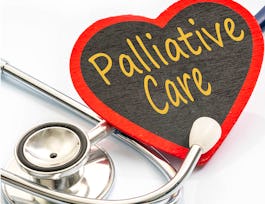Palliative care provides invaluable help for patients living with serious or life-limiting illness and their family caregivers. Palliative care should be part of healthcare services to improve quality of life, the ability to tolerate and benefit from treatment and improve survival. In this course, you will learn about the nature of suffering and how this concept can help you understand the experience of people living with serious illness. Next, you will learn skills to more effectively communicate with patients, families and other care providers to both understand their experiences and provide an extra layer of support. In the next module you will explore your own core values and beliefs and how they impact your work with others. Finally, you will learn how to do a whole person assessment to understand the needs of people with serious illness so you can develop a plan to support them.

Give your career the gift of Coursera Plus with $160 off, billed annually. Save today.


What is Palliative Care?
This course is part of Palliative Care: It's Not Just Hospice Anymore Specialization



Instructors: Regina Fink
9,345 already enrolled
Included with
(286 reviews)
Details to know

Add to your LinkedIn profile
7 assignments
See how employees at top companies are mastering in-demand skills

Build your subject-matter expertise
- Learn new concepts from industry experts
- Gain a foundational understanding of a subject or tool
- Develop job-relevant skills with hands-on projects
- Earn a shareable career certificate


Earn a career certificate
Add this credential to your LinkedIn profile, resume, or CV
Share it on social media and in your performance review

There are 5 modules in this course
In this module, you will learn about suffering. Suffering is different for each person living with serious illness. Suffering has many causes, such as pain, and other physical symptoms. People also suffer because of emotional, spiritual and social concerns. If you have done a great job of easing pain, but you don’t offer help for other problems, the person will still suffer. You will learn how to help people feel like someone understands them and they are not alone. You will learn how to help people feel better, with less confusion and more hope. Finally, you will hear Ollie Green talk about his experiences of illness and suffering.
What's included
14 videos11 readings2 assignments
In this lesson, you’ll learn about SNAP, an easy-to-remember set of skills to use for effective conversations about values and beliefs.
What's included
2 videos2 readings1 assignment
In this module you will learn about the importance of good communication skills as we work with patients and families living with serious illness. People often believe that communication skills are something you are born with... She is just ‘a natural’ at talking with patients and families. They always love to talk with her. I am just not good at talking with others… We would never say “She is just 'a natural' at walking, reading, driving a car or any of other things that we need to be able to do to live and enjoy our lives." We watch and learn from others and then we work and practice until we can master a new skill. We all can learn ways to be better at communicating with patients and families. We can learn basic skills of active listening, being supportive, providing and reinforcing information to patients and families, and encouraging the patient/family caregiver to talk with us. In this module, we will review some specific techniques to use when we share bad news with a patient and family caregiver. This can be scary and uncomfortable for both the patient, the family caregiver and the healthcare providers. However, this too can become a natural part of our goal of patient-centered communication.
What's included
11 videos6 readings1 assignment
This module has three lessons. In the first lesson, you will explore your personal values and beliefs around health, illness and dying. This self-awareness will improve your ability to have effective palliative care conversations with people who have serious illnesses. In the second lesson, you will reflect on your values and beliefs from childhood and consider what's important to you as an adult. We will focus on values and beliefs around health, illness and dying, all of which are important to consider in palliative care. Lastly, you will reflect on your potential to judge or pull away from people who don't share your values and beliefs.
What's included
7 videos3 readings1 assignment
In this module we will talk about the need to assess all dimensions of health. These include the physical, the spiritual, the psychological, the social and the economic areas that cause people living with serious illness distress.
What's included
4 videos1 reading2 assignments
Instructors


Offered by
Recommended if you're interested in Patient Care

University of Colorado System

University of Colorado System

University of Colorado System

Stanford University
Why people choose Coursera for their career




Learner reviews
Showing 3 of 286
286 reviews
- 5 stars
83.62%
- 4 stars
13.24%
- 3 stars
2.43%
- 2 stars
0.34%
- 1 star
0.34%
New to Patient Care? Start here.

Open new doors with Coursera Plus
Unlimited access to 7,000+ world-class courses, hands-on projects, and job-ready certificate programs - all included in your subscription
Advance your career with an online degree
Earn a degree from world-class universities - 100% online
Join over 3,400 global companies that choose Coursera for Business
Upskill your employees to excel in the digital economy
Frequently asked questions
Access to lectures and assignments depends on your type of enrollment. If you take a course in audit mode, you will be able to see most course materials for free. To access graded assignments and to earn a Certificate, you will need to purchase the Certificate experience, during or after your audit. If you don't see the audit option:
The course may not offer an audit option. You can try a Free Trial instead, or apply for Financial Aid.
The course may offer 'Full Course, No Certificate' instead. This option lets you see all course materials, submit required assessments, and get a final grade. This also means that you will not be able to purchase a Certificate experience.
When you enroll in the course, you get access to all of the courses in the Specialization, and you earn a certificate when you complete the work. Your electronic Certificate will be added to your Accomplishments page - from there, you can print your Certificate or add it to your LinkedIn profile. If you only want to read and view the course content, you can audit the course for free.
If you subscribed, you get a 7-day free trial during which you can cancel at no penalty. After that, we don’t give refunds, but you can cancel your subscription at any time. See our full refund policy.



